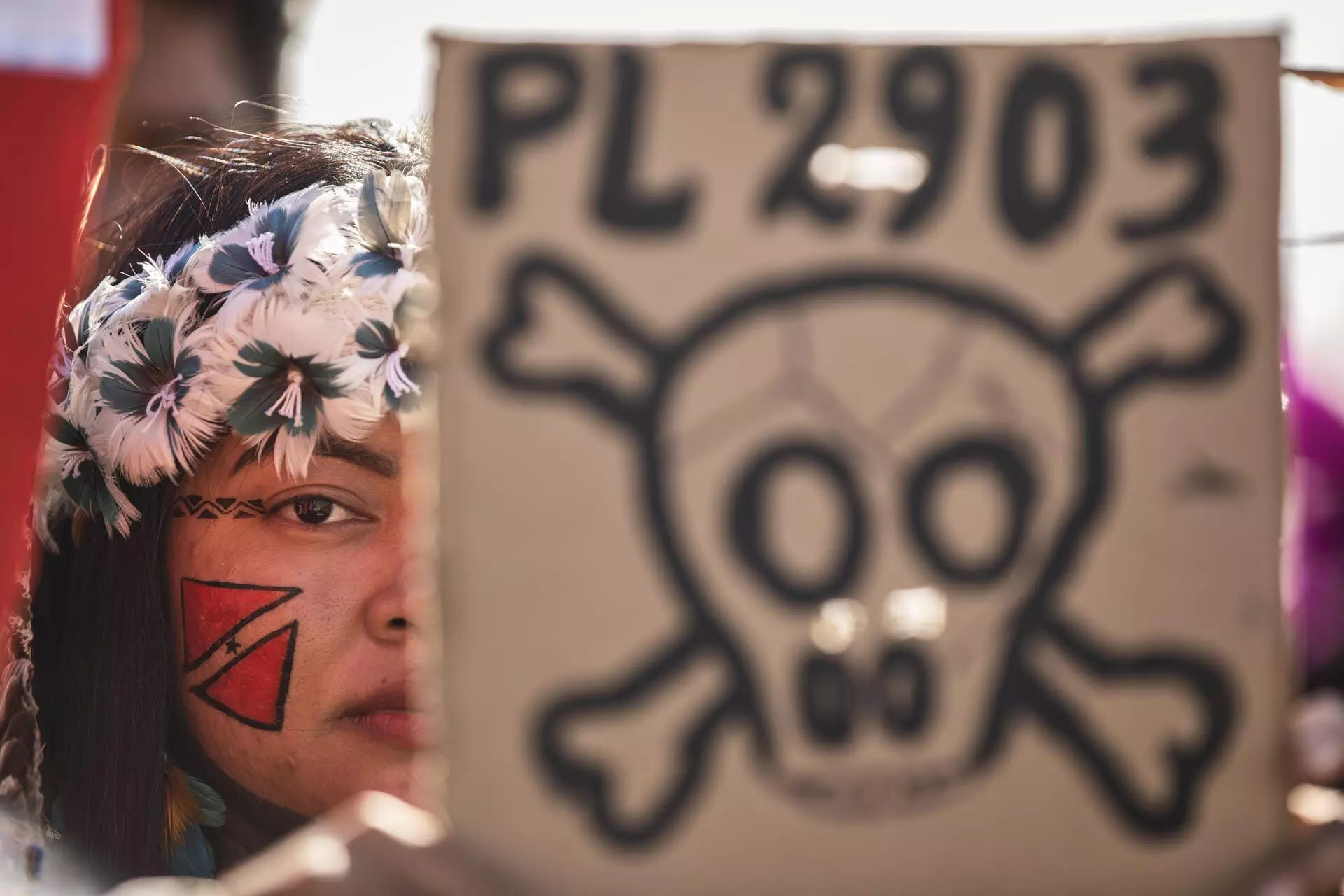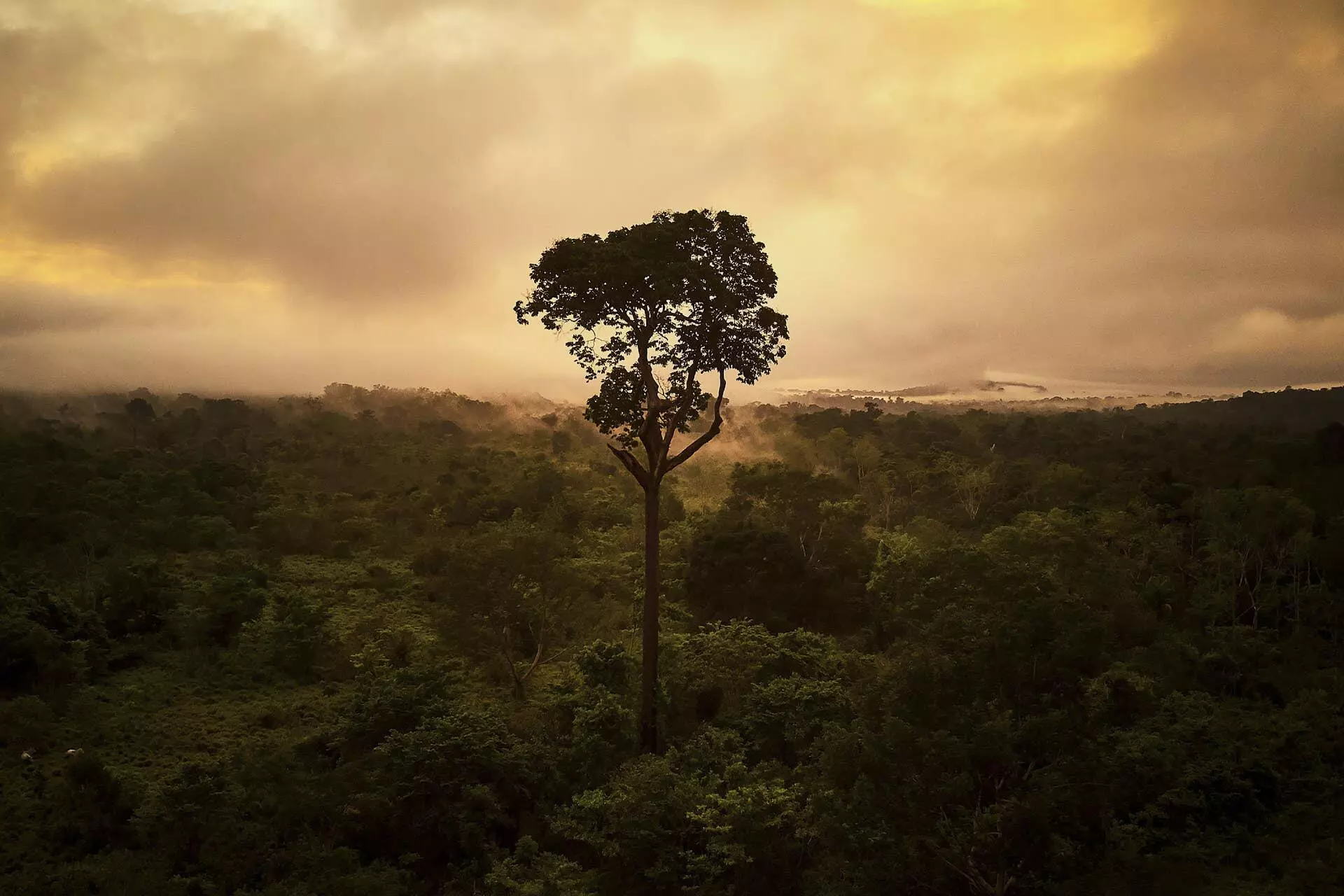Ever since SUMAÚMA published its manifesto in 2022, we have tried to tell the forest’s stories from the inside. We have been reporting in times of war, the biggest yet faced by our species, a war against nature that began more than 200 years ago, with a fossil-fuel based industrial revolution (coal, then oil and gas) that has led to climate collapse. We are here, along the Middle Xingu River, on the front lines. We know and we feel what those at the bottom of Brazil’s map, in the Center-South region, do not like to hear. We know that readers of our trilingual platform elsewhere on the planet also prefer not to hear this. We know that some who support our work listen and understand, but perhaps do not yet feel the threat at a visceral level. We have made strides to tell this story at depth with precision, and seriousness – in Portuguese, English, and Spanish. Sometimes we do all of this and still we shout. Yet most people, even those that say they are listening, are not listening. Because listening is acting – as the Guarani Kayowá language remind us. I have to tell you that at this start of the Amazonian summer, awaiting the season of illegal fires, I feel almost powerless to get people to listen. The “almost” in that last sentence is important. It is that “almost” that conveys the possibility that moves us.
We have no time for inspirational speeches. I feel our readers are mature, regardless of how old they are, and they should be able to deal with a threat that ranges from a worsened quality of life on the planet (the point we are at now) to the risk of extinction. This is perilous ground. While I write to you, a rural leader threatened with death has attempted suicide three times. What the grileiros (those who steal public lands, often later becoming mayors, lower house members, or even senators) could not do – which is kill him – they are now lose to accomplishing by forcing him to take refuge far from everything he knows, from his family, and from the fight that gives life meaning. Many of those fighting for the Amazon endure harassment, with cameras surveilling the doors to their houses, suffering deceitful attacks on social media, and chased by strange cars with tinted windows.
I keep repeating over and over that we are at war, but I see that most people actually prefer to believe, for their own well-being, that my discourse is political or merely rhetorical. Yes, it is political; but it is only political, at least political as I understand it and far removed from what is done in this brutal Congress, because it is anchored in the truth of these days. The war has already arrived in Brazil’s center-south region, it’s already everywhere – and has been for a while. How many extreme events do there need to be, how many hillsides and homes need to come crashing down on heads, how many droughts destroying crops, how many floods sweeping away every living thing, until people understand? What I am starting to fear is that people will watch their lives grow smaller around them, they will confine themselves, yet they still prefer to cling to illusions rather than fighting for their lives.
Years ago, I was surprised that many in our species have lost their survival instinct. We have seen millions of humans killed by the Covid virus’s determination to survive. And we will see more. The most basic organism has the instinct to survive. Yet capitalism has destroyed the human instinct to survive, shaping generations of individuals who believe they live for their supposed freedom, when they are just passive consumers of all of the ordinary goods they swallow up along with the planet destroyed to produce them. Most of those who look at themselves with some degree of truth will find they also hold a belief that something will save them and their children, be it technology, artificial intelligence, the possibility of colonizing another planet, or some type of higher power.
It won’t. That is what SUMAÚMA’s reporting has shown week after week. Either we fight or we fight. Sides must be picked.

Indigenous peoples follow court hearings on the land demarcation bill outside of the Federal Supreme Court, in Brasília. Justice André Mendonça took the case under advisement, putting any ruling on hold for up to ninety days. Photo: Joedson Alves/Agência Brasil
The right-wing, nature-vandalising Congress dominates Brazil and, without mobilization, it could accelerate the planet’s destruction, as shown in a report in this edition by Rafael Moro Martins. There is a highly developed agro-military project in the Amazon that is quickly advancing to take power in 2026. Some of today’s leaders are under greater threat under the Lula administration than they were under Bolsonaro, because there is a reaction from the extreme right that commands Amazonian cities and does not want to lose ground – in every sense. Meanwhile, corporate media is celebrating a downgrade in the country’s risk, with “market” influencers lauding economic measures, the same old rigmarole, the one that has brought us to the abyss. Deforestation under Marina Silva’s Ministry of Environment and Climate Change and Sonia Guajajara’s Ministry of Indigenous Peoples has much less space in the press and in minds, as if it were not about economics and survival. As if what is happening were not happening. As I wrote in the previous editorial, governability is bathed in blood.
At SUMAÚMA, we are committed to journalism: respecting facts, having the courage to state them, and doing this on the front lines of a war being waged against nature, alongside the peoples-nature. I respect you all enough to say: it is hard, very hard, and it is going to get worse. I hope you are aware of the cost to those on the front lines doing each report for SUMAÚMA. I hope you are committed to the lives of everyone who is fighting with much less power and far fewer resources than the predators of the Amazon, of the planet, of your life.
I write to you while looking at a towering palm tree. I like to look at it because it is inhabited by so many different species, a planet unto itself with other planets inside of it. And one day someone will come – and I see this almost every week, if not every day – and just knock it down, it and all of its planets, millions of lives dying in one second. Millions disappearing in the blink of an eye.
Today, those affected by extreme events – caused by a climate crisis provoked by a ruling minority of humans (major transnational corporations, the governments and congressional bodies they finance, the billionaires and multimillionaires who control them, and those that serve them) – can have an idea of what the forest’s creatures experience. In one second, a house or a hillside collapses or is underwater. In one second, it’s all over. In just this year we have seen it happen on São Paulo’s northern coast, in Acre, in Bahia, in Santa Catarina and in Rio Grande do Sul. And that is just in Brazil. Were we to talk about the rest of the world, this text would become a book. And we are only in June.
I look at the palm tree and all of the neighbors around it, my neighbors who have lived here for much, much longer than I have, and I wait for the holocaust, because it will come in the form of illegal fires, as it does year after year. I want to repeat that the world that is destroyed here destroys the world there where you read this. Yet I have little hope that you will really listen, beyond a contrite conversation. We continue fighting, even if joy must be ripped from the ashes. But do not be deceived, we are being massacred.
Eliane Brum
Sower of SUMAÚMA
Spell check (Portuguese): Elvira Gago
Translation into Spanish: Meritxell Almarza
English translation: Sarah J. Johnson
Photography editing: Marcelo Aguilar, Mariana Greif and Pablo Albarenga
Page setup: Érica Saboya

Daybreak over the Arinos River, in Mato Grosso. ‘But do not be deceived, we are being massacred.’ Photo: Pablo Albarenga





